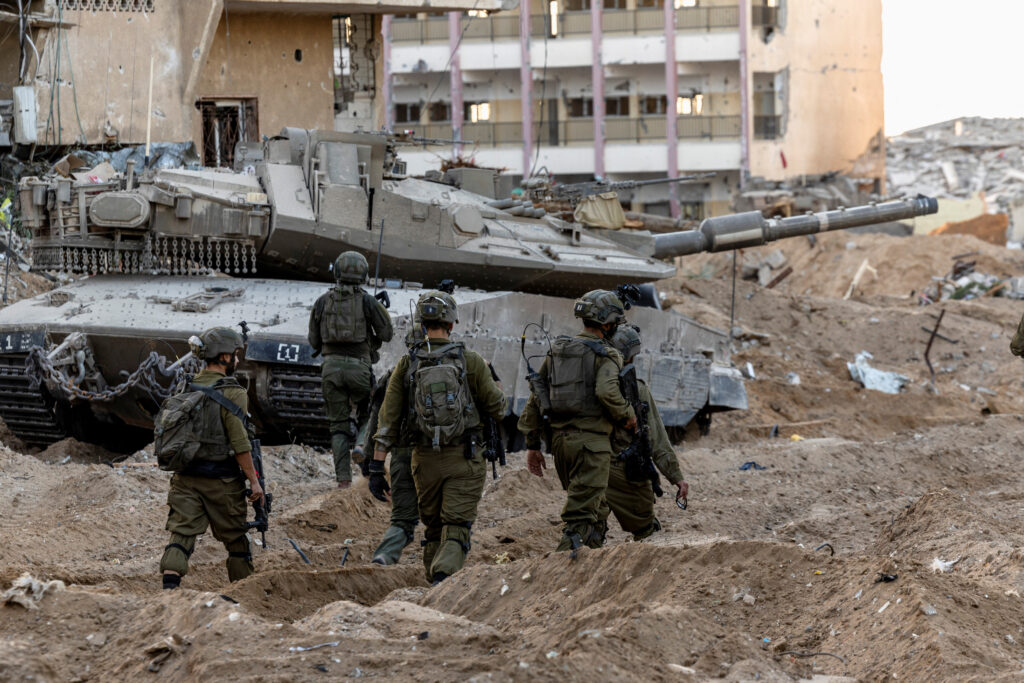Israeli military ramps up its attacks on southern Lebanon, pushing the region closer to a new phase of conflict.
Israel’s assault on Hezbollah has been ratcheting up the pressure, short of an all-out war.
Israel is trying a very high-stakes gamble of ratcheting up its attacks to make Hezbollah flinch back at the very time that it is raising its chances for an aggressive reaction that degenerates into a land war.

Explosive pagers on Tuesday. Exploding walkie-talkies on Wednesday.
A series of especially violent blasts took place on Thursday, followed by a huge strike in southern Beirut on Friday.
Israeli attacks on Hezbollah, the Lebanese militia, this week represent a significant escalation in the 11-month war between the two sides.
For nearly a year, Israel and Hezbollah have been at war, sort of-most notably along the Israeli-Lebanese border-with steadily mounting violence that has never reached a boiling point.
Israeli Military takes its turn of a far more perilous playbook
It escalated the brutality of its attacks in an attempt to goad Hezbollah to withdraw while maximizing the prospects for the opposite outcome: that Hezbollah would retaliate with a far more virulent potent force that boils into war without limits on land.
Israeli military has crushed hundreds, if not thousands, of Hezbollah’s communications devices in a massive cyberattack.
Its fighter jets have pounded southern Lebanon with rare force.
And on Friday afternoon, for the first time since July, they attacked the capital of Lebanon, Beirut, killing a top Hezbollah military commander, Israeli officials said, and causing two buildings to collapse, Lebanese officials said.
Also Read: Nature’s Pharmacy Medicinal Garden Kit Review & Insights
Still, despite everything that happened Friday, the general balance of the two sides seemed to hold at least for the time being on Friday afternoon.
Israel’s steps by no means brought a knockout blow: they neither humiliated Hezbollah nor created terror among the Lebanese people, but still failed to browbeat the militia into changing its course.
The militia continued its short-range bombardment of northern Israel on Friday, just hours after its leader, Hassan Nasrallah, said it would continue the attacks until Israel stops its parallel war in Gaza.
That conflict began with deadly attacks on Israel by Hamas and other militants in October. But this week’s attacks looked like the tit-for-tat attacks that have been traded by the sides for 11 months.
Hezbollah said it will respond “definitely” to Israel’s bombardment of its pagers and walkie-talkies – which killed at least 37 people and left thousands more wounded – but did not say when.
That may be a sign that, with many of its operatives in the hospital, the group is still trying to grasp its losses.
Israeli leaders said Thursday the war has entered a new phase, with Defence Minister Yoav Gallant promising Hezbollah will pay an increasing price “as time goes by”. However, he fell far short of committing to a ground invasion of southern Lebanon.
The Israeli military said it has redeployed a paratrooper division to northern Israel but does not appear to be on the cusp of a major ground maneuver, even as its air force and intelligence services intensify their strikes.
For now, both the war in Lebanon and the war in Gaza teeter, still to be resolved.
It seems unlikely that the war between Israel and Hezbollah can be considered as coming to an end without some accommodation in Gaza, and negotiations that may lead to that accommodation have stalled nearly to a standstill over disputes between Israel and Hamas.
You May Like to Read: Scholasticide | The Destruction of Education in Conflict Zones and the Erosion of International Law
Even both conflicts seem far from a military resolution, too. For all its new moves, Israel still seems several steps away from a decisive military blow in Lebanon and has failed to deliver that here, despite decimating Hamas’s forces in Gaza.
The group still holds dozens of hostages in the pockets of Gaza that it controls, preventing Israel from declaring victory.
Final Words
To summarize, the rising conflict between Israel and Hezbollah signals a watershed moment, with heightened military aggressiveness on both sides and the approaching possibility of a full-fledged land war.
Despite Israel’s increasing airstrikes, Hezbollah remains defiant and continues its retaliation strikes. The delicate balance between the two forces teeters on the verge, with no obvious conclusion in sight.
As tensions escalate, the risk of a larger regional conflict arises, driven by the unresolved situation in Gaza. The following weeks will likely determine whether this conflict escalates into violence or moves closer to a negotiated conclusion, but for the time being, the stakes remain extremely high.
